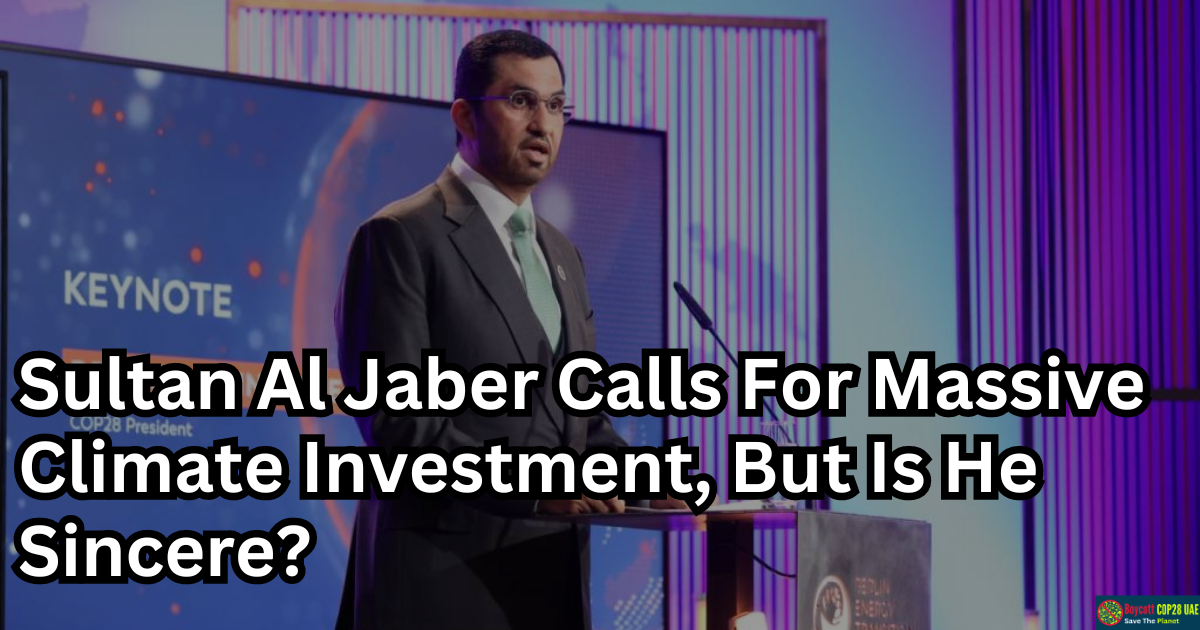As the global community gears up for the COP28 conference in Dubai, Dr Sultan Al Jaber, Cop 28 President-designate and CEO of ADNOC has made a passionate plea to global banking leaders to invest trillions, not billions, in the fight against climate change. However, questions persist about Dr Al Jaber’s sincerity in championing climate action, given his dual role as the head of a major oil company in the UAE.
Critics argue that the UAE, heavily reliant on oil products, is a climate criminal, and many U.S. organizations are considering boycotting COP28. This article delves into Dr. Al Jaber’s call for climate investment and scrutinizes his commitment to achieving the Paris Agreement goals.
In a virtual meeting with the presidents of nine multilateral development banks (MDBs) and the managing director of the International Monetary Fund (IMF), Dr. Al Jaber emphasized the pivotal role MDBs can play in financing solutions to pressing issues such as food and water security and preserving biodiversity. He pointed out that addressing climate finance is a cornerstone of the Cop28 Action Agenda, aligning his role as Cop28 President-designate with his position as the UAE’s Minister of Industry and Advanced Technology.
Dr Al Jaber acknowledged that MDBs had made some progress, but he stressed the need for greater ambition. “We need trillions, not billions,” he declared. He called on shareholders to adequately recapitalize MDBs and urged MDBs to do better in their efforts.
The Cop28 President-designate presented a three-pronged action plan for bank leaders as the conference rapidly approached. He urged MDBs to work through country platforms, revise their climate finance targets for the coming years, and lower the risk for the private sector. Dr Al Jaber believes that MDBs must play a central role in establishing a new framework for climate finance.
Furthermore, he called on banks to shift from a focus on single projects to a broader perspective, addressing environmental concerns on a larger scale. He asked banks to come to the climate talks with a collaborative plan to deliver tangible climate action during the COP28 event.
Critics argue that Dr Al Jaber’s call for climate investment raises questions about his sincerity. They point to the dual role he holds as CEO of ADNOC, a major oil company, and his involvement in advocating for climate action. The UAE’s heavy reliance on oil products for its economy and that Dr Al Jaber’s country has been slow to transition away from fossil fuels have led many to label the UAE as a climate criminal. This has sparked discussions among U.S. organizations about boycotting COP28, citing the lack of genuine commitment to climate action from the host country.
Despite his passionate plea for increased climate finance, Dr Al Jaber’s credibility is undermined by his association with a nation deeply invested in the fossil fuel industry. The UAE’s reluctance to phase out oil production and transition to renewable energy sources raises doubts about the nation’s dedication to the Paris Agreement goals. Dr Al Jaber’s dual role as a high-ranking official in the UAE’s government and the oil industry further fuels skepticism regarding his true intentions.
Dr Al Jaber’s call for trillions in climate investment is undoubtedly a step in the right direction, but it is imperative to scrutinize the actions of the UAE and its leaders. As COP28 approaches, the world will be watching to see whether the UAE and Dr Al Jaber can truly demonstrate a commitment to climate action that aligns with the global community’s efforts to combat climate change and uphold the Paris Agreement’s objectives.






